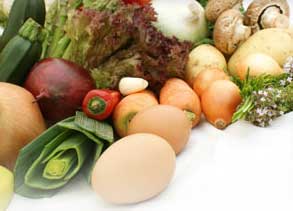Choline
From Health Wiki
Vitamin Bp (Choline)
Contents |
Description
Vitamin Bp, also known as Choline, is not an official B vitamin, although it is often associated with this group because of how it interacts with other nutrients. The human body is capable of making some choline, but it is necessary to gain the needed amount through various food consumption and/or dietary supplement. This vitamin is important for the normal functioning of the liver, aids in the metabolism of proteins, fats and hormone production, assists in the regulation of cholesterol and is overall essential for the body’s growth. Choline plays a role in the transmission of impulses from the brain throughout the central nervous system and is involved in the normal functioning of the muscles as well as helps to improve brain functions, especially memory.
Health Benefits
There are a variety of noted health benefits to be gained by healthy levels of choline in the body including the treatment and prevention of Parkinson’s disease, Alzheimer's Disease, liver disorders, atherosclerosis, tardive dyskinesia and thrombosis. Choline has been shown to be beneficial, almost essential, to the development of the brain and memory of fetuses and infants as well as maintains memory functions and prevents deteroriation in the elderly. This vitamin also ensures the proper functioning of the liver, kidneys, adrenal glands, heart and lungs.
Beauty Benefits
A variety of beauty benefits are included with the intake of choline such as the role it plays, particularly when gained from food sources, in improving the complexion. Since it is involved in cell functions of the body, it is no surprise that it is important to keep our skin glowing and fresh. This also helps to prevent and treat acne and other skin conditions such as rosacea. Other benefits to the skin include tight, toned and wrinkle-free smooth complexions when normal levels of choline are maintained as well as healthy vision and skin elasticity. Optimum hydration is reached with intake of the necessary amounts of choline as well as healthy hair and nails.
Food Sources
- Butter
- Cauliflower
- Egg yolks
- Legumes
- Lettuce
- Liver
- Meat
- Milk
- Peanuts
- Soybeans
- Fish
- Green Leafy Vegetables
Daily Dose Recommendations
- Infants: 0-6 Months 125 Mg, 7-12 Month 150 Mg.
- Children: 1-3 Years 200 Mg, 4-8 Years 250 Mg.
- Boys: 9-13 Years 375 Mg, 14-18 Years 550 Mg.
- Girls: 9-13 Years 375 Mg, 14-18 Years 440 Mg.
- Men: 550 Mg.
- Women: 425 Mg.
- Pregnant: 450 Mg.
- Breast Feeding: 550 Mg.
Deficiency
Choline is essential to the health of the body’s cells. Deficiency in choline has been found to cause fatty liver AKA hepatosteatosis, liver damage, muscle damage, and other disorders such as memory, growth, or pancreatic disorders. It has also been found to promote and stimulate cancer promoting and initiating actions. Various symptoms of a deficiency in choline include but are not limited to high blood pressure, dysfunctional brain and memory activities, kidney and liver dysfunctions or impairment, neurological diseases and fatty liver. Other symptoms also involve the deterioration and degeneration of the kidneys, heart, lungs and adrenal glands.
